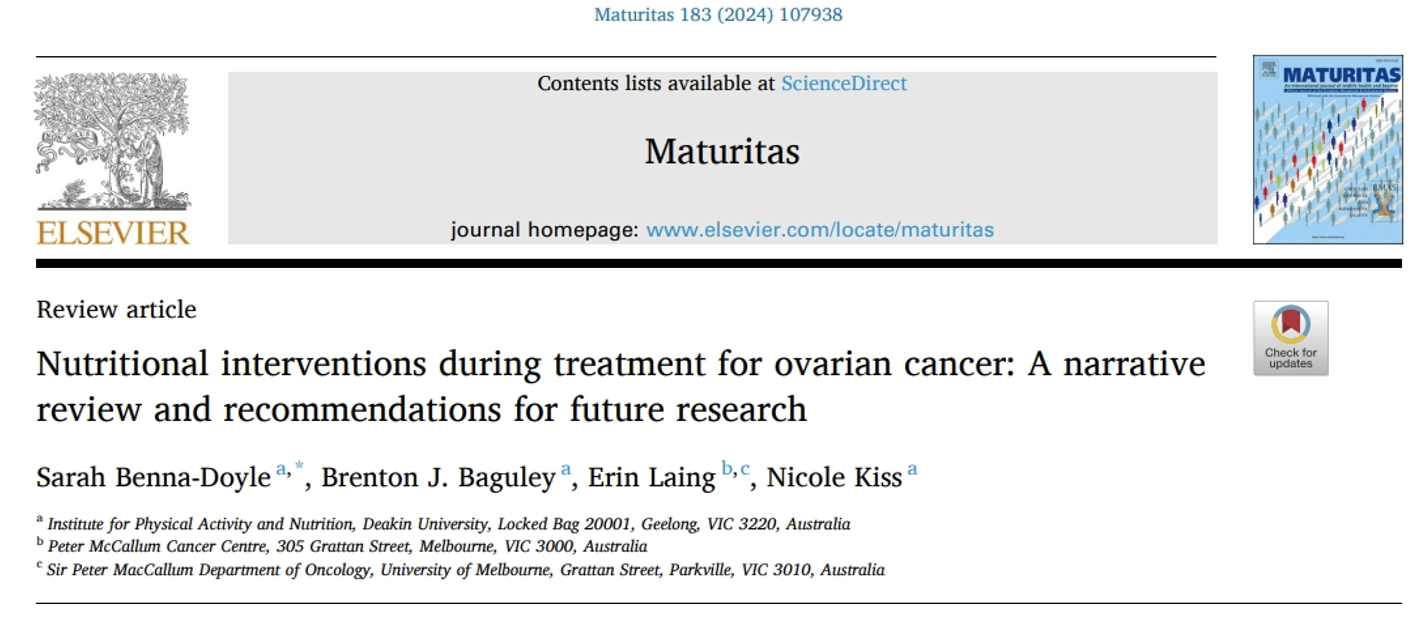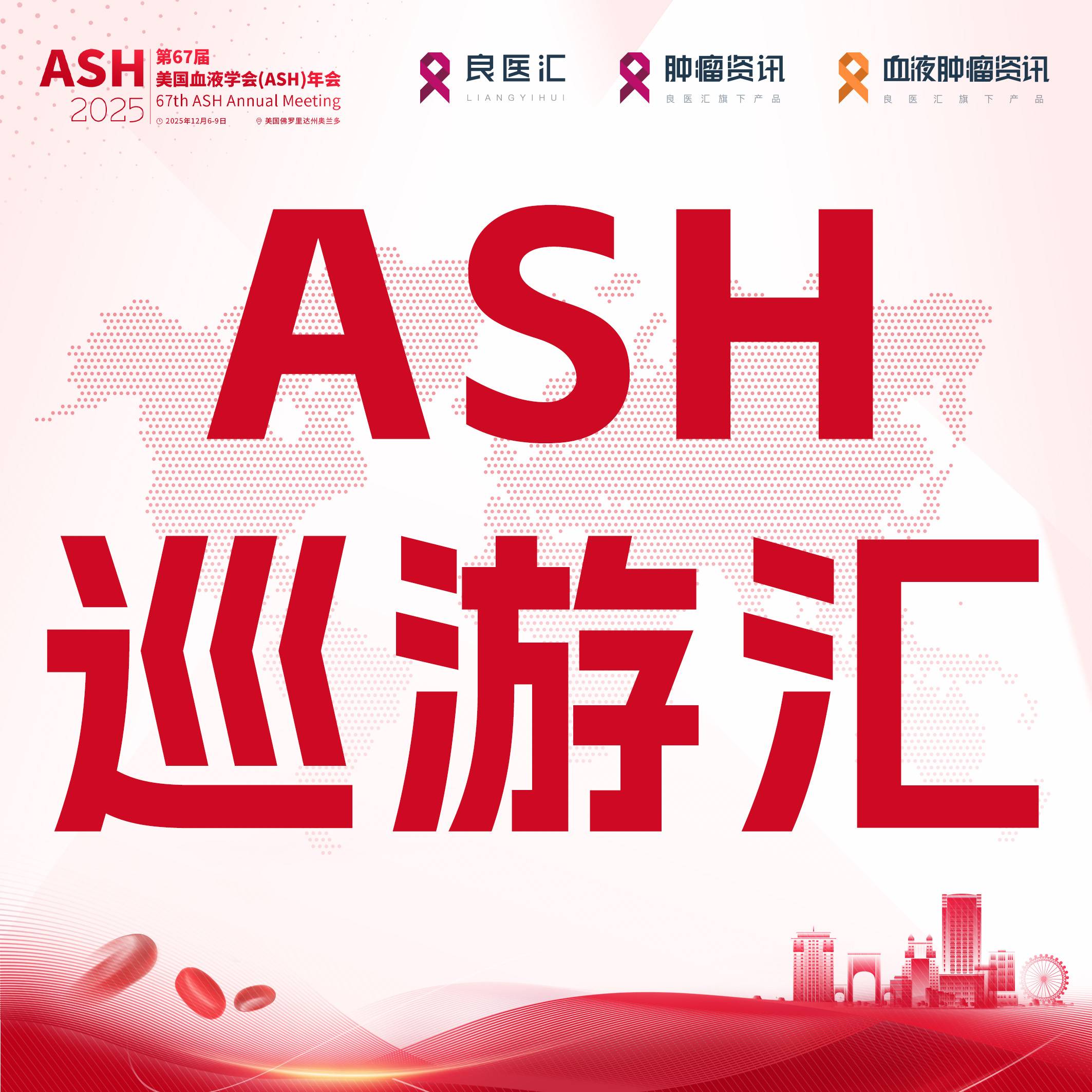卵巢癌,作为妇科恶性肿瘤中的隐形杀手,常常在晚期才被发现,此时患者的营养状况和肌肉质量往往已经受到了严重影响。面对这一挑战,尽管传统的治疗手段如手术和化疗是治疗卵巢癌的基石,但它们在提高患者生存率方面的效果有限。近年来,营养干预作为一种辅助治疗手段,因其在改善患者营养状态、增强治疗耐受性和提升生活质量方面的潜在益处,逐渐受到重视。2024年2月,国际知名期刊Maturitas发表了一篇综述文章,通过个性化营养咨询和营养补充,不仅能改善患者的身体状态,还可能与生存率的提高相关联[1]。综述作者是来自Deakin University的Sarah Benna-Doyle教授。
 卵巢癌,妇科肿瘤中的严重威胁,往往晚期才被诊断,患者此时普遍面临营养不足和肌肉退化的双重挑战。研究表明,高达70%的卵巢癌患者在诊断时存在营养不良,而约40%的患者受到肌肉流失的困扰,这些因素直接影响了患者的治疗效果和生活质量[2-4]。因此,针对卵巢癌患者在治疗期间的营养干预显得尤为重要。
卵巢癌,妇科肿瘤中的严重威胁,往往晚期才被诊断,患者此时普遍面临营养不足和肌肉退化的双重挑战。研究表明,高达70%的卵巢癌患者在诊断时存在营养不良,而约40%的患者受到肌肉流失的困扰,这些因素直接影响了患者的治疗效果和生活质量[2-4]。因此,针对卵巢癌患者在治疗期间的营养干预显得尤为重要。
为了更好地理解营养干预在卵巢癌治疗中的作用,研究者们采用了系统的文献回顾。以营养与饮食学会推荐的“叙述性综述清单”为指导[5],通过检索Medline、EMBASE、Cochrane和CINAHL等医学数据库,研究者们筛选了一系列关于卵巢癌治疗期间营养干预的英文文献,包括临床试验、系统评价和荟萃分析,时间跨度直至2023年11月。
在对文献的综合分析中,研究者们发现了一些积极的信号。例如,一项对98名卵巢癌患者的回顾性研究发现,通过个性化营养咨询和营养补充,患者的营养状态得到了显著改善,并且这种改善与生存率的显著提高相关(18.5个月 vs. 9.8个月,p < 0.0001)[6]。此外,一项针对15名即将接受手术治疗的卵巢癌患者的前瞻性研究发现,多模式预康复计划(multimodal prehabilitation program),包括营养干预在内,能够显著减少患者的住院时间(5天 vs. 7天,p = 0.04)[7]。营养干预包括个性化营养咨询,确保患者获得足够的能量和蛋白质摄入,有时还会口服营养补充剂和免疫营养产品。此外,化疗期间的营养干预,如口服营养补充剂和营养教育,也显示出改善患者营养状况和生活质量的潜力[8-12]。这些发现表明,营养干预可能对卵巢癌患者的治疗和恢复过程产生积极影响。
尽管初步结果令人鼓舞,但研究者们指出,目前的研究规模有限,且缺乏长期跟踪数据。因此,未来的研究需要在更大规模的样本上进行,以便更准确地评估营养干预的有效性,并探索其对肌肉质量和临床结果的长期影响[13]。此外,研究者们也强调了对卵巢癌患者在治疗期间营养需求和体验的深入了解,以便开发出更加个性化和以患者为中心的营养干预措施。
总结来说,营养不良和肌肉流失在卵巢癌患者中是一个严重的问题,可能会对治疗效果产生负面影响。虽然目前关于营养干预的研究还不足以形成明确的临床指导建议,但已有的证据表明,早期和个性化的营养干预可能有助于改善患者的治疗结果。未来的研究应当着重于评估这些干预措施的长期效果,并为卵巢癌患者的营养管理提供更加坚实的科学依据[14-15]。此外,随着对卵巢癌患者营养状况认识的深入,未来的研究还应包括对患者生活质量的评估,以及营养干预对患者心理和社会福祉的影响,从而为患者提供全面的营养支持和改善其整体健康状况。
1. Benna-Doyle S, Baguley BJ, Laing E, Kiss N. Nutritional interventions during treatment for ovarian cancer: A narrative review and recommendations for future research. Maturitas. Published online February 10, 2024. doi:10.1016/j.maturitas.2024.107938
2. B. Laky, M. Janda, J. Bauer, C. Vavra, G. Cleghorn, A. Obermair, Malnutrition among gynaecological cancer patients, Eur. J. Clin. Nutr. (2007), https://doi.org/10.1038/sj.ejcn.1602540.
3 L.I. Hertlein, A.N. Kirschenhofer, S.O. Fürst, et al., Malnutrition and clinical outcome in gynecologic patients, E J Obstet Gynecol Reprod Biol (2014), https://doi.org/10.1016/j.ejogrb.2013.12.028.
4. C.H. Chantragawee, V.U. Achariyapota, Utilization of a scored patient-generated subjective global assessment in detecting a malnourished status in gynecologic cancer patients, Asian Pac. J. Cancer Prev. (2016), https://doi.org/10.14456/apjcp.2016.272.
5. Academy of Nutrition and Dietetics, Narrative Review Checklist. https://legacyfile share.elsevier.com/promis_misc/ANDJ%20Narrative%20Review%20Checklist.pdf. (Accessed 9 December 2023) (Internet).
6. C.A. Prado, A.L. Laviano, C.H. Gillis, et al., Examining guidelines and new evidence in oncology nutrition: a position paper on gaps and opportunities in multimodal approaches to improve patient care, Support Care Cancer (2022), https://doi.org/10.1007/s00520-021-06661-4.
7. N.Y. Balogun, A.L. Forbes, M.A. Widschwendter, A.N. Lanceley, Noninvasive nutritional management of ovarian cancer patients: beyond intestinal obstruction, Int. J. Gynecol. Cancer (2012), https://doi.org/10.1097/IGC.0b013e318256e4d3.
8. M.A. Muscaritoli, J.A. Arends, P.A. Bachmann, et al., ESPEN practical guideline: clinical nutrition in cancer, Clin. Nutr. (2021), https://doi.org/10.1016/j.clnu.2021.02.005.
9. D. Gupta, C.G. Lis, P.G. Vashi, C.A. Lammersfeld, Impact of improved nutritional status on survival in ovarian cancer, Support Care Cancer (2010), https://doi.org/10.1007/s00520-009-0670-y.
10. B.E. Diaz-Feijoo, N.U. Agusti-Garcia, R.A. Sebio, et al., Feasibility of a multimodal prehabilitation programme in patients undergoing cytoreductive surgery for advanced ovarian cancer: a pilot study, Cancers (2022), https://doi.org/10.3390/cancers14071635.
11. A.N. Ferrero, D.A. Vassallo, M.A. Geuna, et al., Immunonutrition in ovarian cancer: clinical and immunological impact? J. Gynecol. Oncol. (2022) https://doi.org/10.3802/jgo.2022.33.e77.
12. L.I. Hertlein, C.H. Zeder-Go¨ß, S.O. Fürst, et al., Peri-operative oral immunonutrition in malnourished ovarian cancer patients assessed by the nutritional risk screening, Arch. Gynecol. Obstet. (2018), https://doi.org/10.1007/s00404-018-4759-8.
13. T. Maurer, B. Matthias Hans, G. Julia von, et al., Randomised controlled trial testing the feasibility of an exercise and nutrition intervention for patients with ovarian cancer during and after first-line chemotherapy (BENITA-study), BMJ Open (2022), https://doi.org/10.1136/bmjopen-2021-054091.
14. N.A. Qin, G.U. Jiang, X.U. Zhang, D.I. Sun, M.E. Liu, The effect of nutrition intervention with oral nutritional supplements on ovarian cancer patients undergoing chemotherapy. Original research, Front Nutr (2021), https://doi.org/10.3389/fnut.2021.685967.
15. S. Stelten, L. van Lonkhuijzen, Y.A.W. Hartman, et al., Experiences, adherence and satisfaction with a combined exercise and dietary intervention for patients with ovarian cancer undergoing chemotherapy: a mixed-methods study, Gynecol. Oncol. (2022), https://doi.org/10.1016/j.ygyno.2022.03.011.
声明:材料由阿斯利康支持,仅供医疗卫生专业人士参考
审批号:CN-133825
排版编辑:肿瘤资讯-Rex











 苏公网安备32059002004080号
苏公网安备32059002004080号


